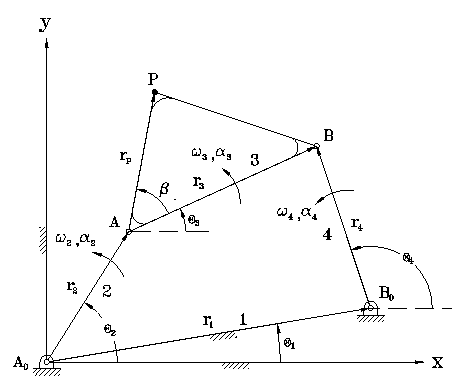

Acceleration analysis begins with formulating the loop-closure equation for the fourbar mechanism shown below.
r2+r3=r1+r4 (1)
i*alpha3*r3*exp(i*theta3)-omega3^2*r3*exp(i*theta3)-i*alpha4*r4*exp(i*theta4) +omega4^2*r4*exp(i*theta4) = i*alpha2*r2*exp(i*theta2)+omega2^2*r2*exp(i*theta2) (2)
After multiplying (2) by exp(-i*theta4), taking the real part and simplifying, we get
alpha3=(-r2*alpha2*sin(theta4-theta2)+r2*omega2^2*cos(theta4-theta2) +r3*omega3^2*cos(theta4-theta3)-r4*omega4^2)/r3*sin(theta4-theta3) (3)
alpha4=(r2*alpha2*sin(theta3-theta2)-r2*omega2^2*cos(theta3-theta2) +r4*omega4^2*cos(theta3-theta4)-r3*omega3^2)/r4*sin(theta3-theta4) (4)
The interface below allows the user to find the two unknown angular accelerations given the link lengths, theta1, one additional position, one angular velocity, and one angular acceleration.
